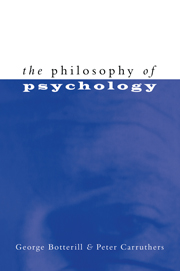Book contents
- Frontmatter
- Contents
- Preface
- Acknowledgements
- 1 Introduction: some background
- 2 Folk-psychological commitments
- 3 Modularity and nativism
- 4 Mind-reading
- 5 Reasoning and irrationality
- 6 Content for psychology
- 7 Content naturalised
- 8 Forms of representation
- 9 Consciousness: the final frontier?
- References
- Index of names
- Index of subjects
4 - Mind-reading
Published online by Cambridge University Press: 05 June 2012
- Frontmatter
- Contents
- Preface
- Acknowledgements
- 1 Introduction: some background
- 2 Folk-psychological commitments
- 3 Modularity and nativism
- 4 Mind-reading
- 5 Reasoning and irrationality
- 6 Content for psychology
- 7 Content naturalised
- 8 Forms of representation
- 9 Consciousness: the final frontier?
- References
- Index of names
- Index of subjects
Summary
We humans are highly social animals, unique in the flexibility with which we can adapt to novel patterns of interaction, both co-operative and competitive. So it is easy to see why our folk psychology, or capacity for mind-reading, is such an important psychological ability, both to individual lives and for our success as a species. But it is not only other minds which one needs to read. What should also be appreciated is that this very same capacity is used to think about what is going on in our own minds, as we shall see further in chapter 9. (One of the themes of this book is that this capacity for reflexive thinking greatly enhances our cognitive resources.) Other theses we argue for in the present chapter are that our mind-reading ability functions via a central module, that it operates by means of applying a core of theoretical knowledge, and that this core knowledge is a product of maturation rather than learning. In other words, we think that the ‘theory of mind’ module (often called ‘ToM’ in the literature on this topic) fits the general view on modularity and nativism which we outlined in chapter 3.
The alternatives: theory-theory versus simulation
Research into our mind-reading capacities has been assisted both by the investigations of developmental psychologists and by the debate between two rival views, theory-theory and simulation-theory.
Theory-theory
Theory-theory is a product of functionalism in the philosophy of mind.
- Type
- Chapter
- Information
- The Philosophy of Psychology , pp. 77 - 104Publisher: Cambridge University PressPrint publication year: 1999

